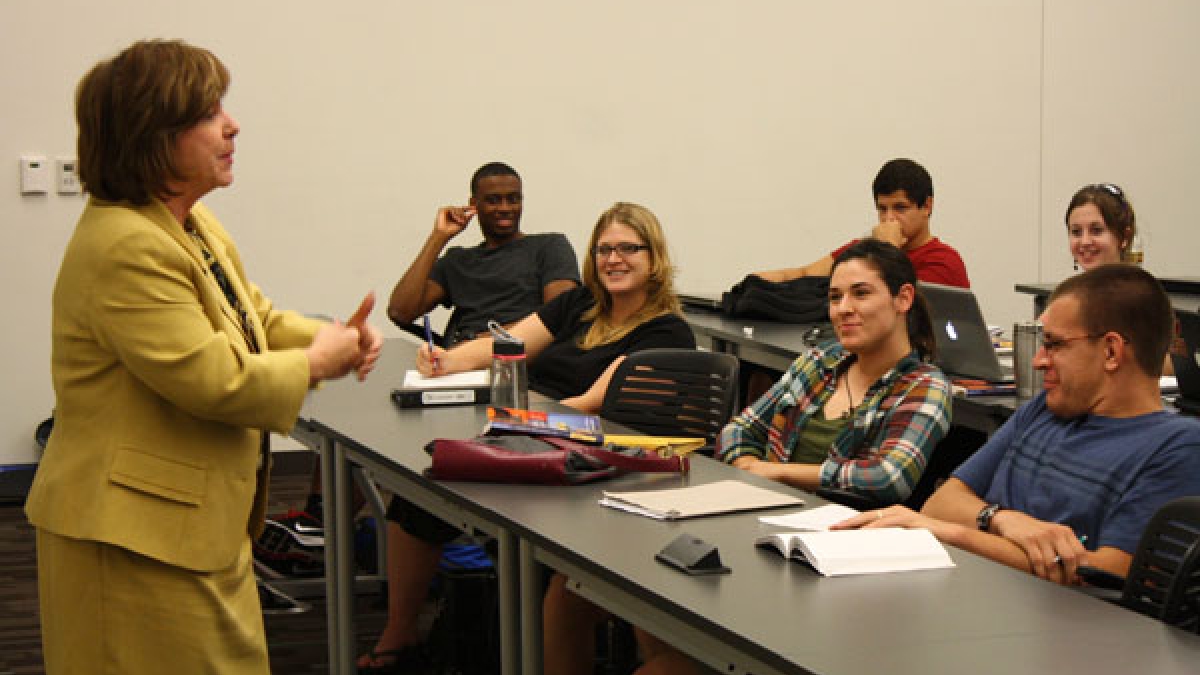Arizona Chief Justice talks to criminology class

Arizona Supreme Court Chief Justice Rebecca White Berch spoke to a criminal law procedure class taught by faculty associate Peter Gentala on the ASU Downtown campus, Sept. 27. Berch, a former state solicitor general and assistant attorney general, spent an hour with criminology and criminal justice students talking about how the court system works and answered a wide array of questions about her experience as a justice and chief justice.
Berch told students she once wanted to be a police officer, but wouldn’t qualify at the time as she was too short and didn’t have 20/20 vision. Instead, she went to law school and litigated cases as an attorney before joining the ASU law school, where she taught and ran the legal writing progam. When former ASU law classmate Grant Woods was elected Attorney General in 1990, she accepted his offer to be the state’s solicitor general, handling the department’s civil appeals.
Berch reminded students that those who pursue careers to uphold the law must hold themselves to a higher standard. She said it had never occurred to her that police officers would lie on the stand, but said she got straightened out pretty quickly.
“Police officers and prosecutors represent society as a whole,” said Berch. “And, if you do that, you have to do that honorably.”
That message was not lost on David Nevarez, a junior majoring in criminology and criminal justice, who is planning a career in law enforcement.
“I was kind of interested in how she mentioned that some people who aren’t ready to follow the law – that take the law into their own hands – shouldn’t go into law enforcement,” said Nevarez. “I think she just made it clear you have to follow the law directly.”
Berch explained to students how the Arizona Supreme Court decides to accept about 70 or so cases a year from 1,200 petitions submitted for review. She also answered a question about why it takes so long for someone sentenced to death to be executed. The Chief Justice said the state appeal process can last several years before it goes to the federal courts for a habeas corpus review, which can last almost a decade. Berch said it can then take a couple more years to hear post conviction relief petitions on the grounds of new evidence or poor legal representation.
David Bonar, a junior in the School of Criminology and Criminal Justice, felt the visit by the chief justice was significant and appreciated what she had to say.
“It’s very relevant to a lot of our course of study and the direction we’re intending to head,” said Bonar.
Berch was asked by a student if any criminal cases she was involved in stood out to her today. She said it’s hard to forget cases in which parents killed their kids in a cruel manner, including one where a father set his daughter on fire, and another where a child died after being confined to a closet.
Berch then told a story about a man dressed in a robe and beard who tried robbing a Walmart store. He pointed what turned out to be an umbrella at employees and began threatening them, asking for money. But the employees couldn’t understand the man wearing a Jesus costume because he had marbles in his mouth.
Criminology and criminal justice junior Adrianna Walters asked Berch several questions, including whether she had any advice on how to prepare for a career prosecuting sex offenses.
“I thought it was very informative and very helpful,” said Walters. “If we could, I would have loved her to stay longer.”
The classroom discussion was the Berch’s third public event of the day.
“It was a surprise to me the extent to which I travel around talking about the Arizona court system,”said Berch.
In addition to talking to students and organizations around the state, Berch also serves on the board of directors for the U.S. Conference of Chief Justices, the board of trustees of the National Conference of Bar Examiners, and on an executive committee for legal education and bar admissions with the American Bar Association.
“I do it to raise the profile of the Arizona court system,” Berch said. “Nationally, I think we have a well respected court system.”
“She is a fantastic ambassador for the court,” said Gentala, who teaches Procedural Criminal Law.
As counsel to the majority party at the Arizona House of Representatives, Gentala has witnessed the chief justice dealing with lawmakers on a formal and informal basis.
“I’ve seen her at the legislature time and time again,” said Gentala. “She takes time with the members and answers their questions.”